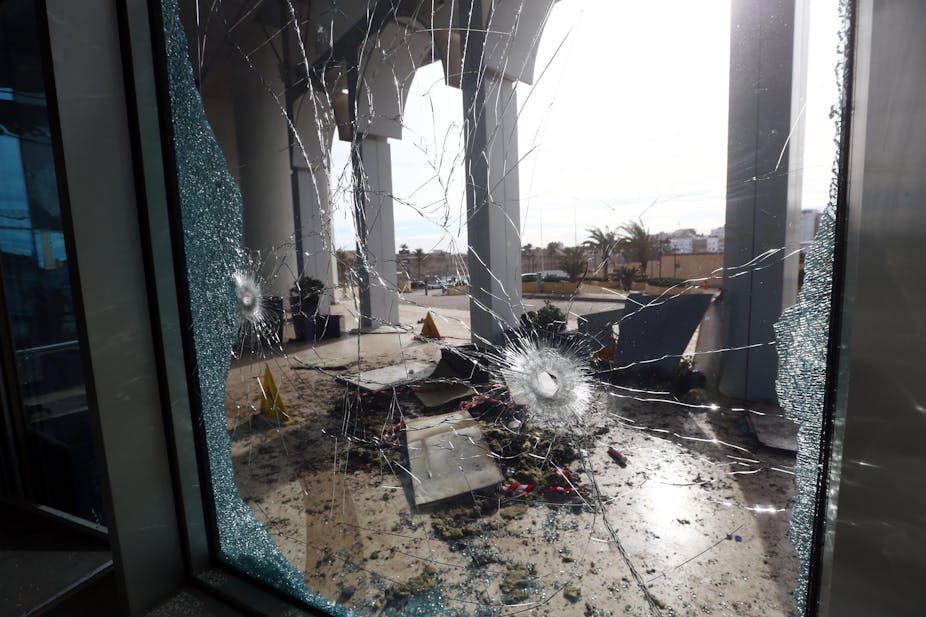The apparent murders of Jordanian pilot Muadh al-Kasasbeh and Japanese journalist Kenji Goto have once again drawn attention to the brutality of Islamic State fighters operating in northern Syria and Iraq.
Meanwhile, four years after the Arab Spring, another bloody week in North Africa has shown just how precarious and pressurised two of that region’s biggest states are – with IS-association fighters at the forefront of deadly operations.
Libya was first: on January 27, militants claiming links to IS stormed the Corinthia Hotel in Tripoli. At least eight people were shot and killed before the gunmen blew themselves up with a grenade in a bid to evade capture.
Two days later, another group of IS-linked militants struck in Egypt’s Sinai peninsula. The attackers targeted police and military installations with mortars, car bombs, and rocket-propelled grenades, reportedly killing at least 27 people.
The instability in both states has enticed some militant groups in both countries to declare themselves as “provinces” of the organisation.
In Libya, the Corinthia Hotel attacks were claimed by the “Islamic State-Tripoli Province”, and involved foreign fighters from Tunisia and Sudan, while the the attack on the Egyptian security installations was claimed by “Islamic State-Sinai Province”. The latter, an off-shoot of the group Ansar Bayt al-Maqdis, declared allegiance to IS in November 2014.
The attacks raise the obvious and pressing question of what, if anything, outside allies can do about the spiralling violence and chaos in both Libya and Egypt – and the short answer, alas, seems to be not much.
Problem peninsula
The problems in both Egypt and Libya are the deep-seated result of decades of brutal misrule, and things are in practice not much better today. Factional interests and cronyism still define the political and economic landscape of both countries, and neither the Egyptian or Libyan authorities (such as they are) have any obvious solutions to hand.
In this highly febrile environment, rash interventions – either by foreign powers or heavy-handed local security forces – may create as many problems as they solve.
In the case of Egypt’s Sinai Peninsula, particularly the northern part, years of poor development, spillover from the nearby Gaza conflict, and the government’s occasionally brutal security measures have created a fertile recruiting ground for any opponents of the Egyptian state.

The militants in Egypt may, at present, represent the more serious threat in terms of capability. And while the strength of the Egyptian armed forces (plus Israel’s security interests in the Sinai) may be able to contain it, an overly aggressive and indiscriminate military response could also generate a steady stream of recruits for the militants, in turn compounding the misery of many in the region.
Somalia on the Mediterranean?
Libya, on the other hand, as Aaron Zelin has recently suggested, may provide more opportune conditions for the expansion of IS-linked groups along the same lines as Iraq and Syria.
Libya’s ongoing civil war has created large areas of that country which are effectively governed by local militias, competing against each other for power, resources, and international legitimacy – crucial to unlocking access to Libya’s oil revenues.
The Corinthia Hotel was attacked because it hosted officials from the Tripoli-based administration, one of two governments competing for control of Libya and both riven by factions. The rival government, which is recognised as the legitimate government by the UN, is currently housed in a hotel in Tobruk, near the border with Egypt.

Some have argued that the lack of a stable central authority in Libya could create a “Somalia on the Mediterranean” – a lawless mess of foreign militants huddled on Europe’s doorstep. But it remains open to debate whether Libya’s IS affiliates would actually be as great a threat to the West as the Gaddafi regime, which after all sponsored deadly and effective paramilitary groups as diverse as the Provisional IRA and the Popular Front for the Liberation of Palestine.
Still, whatever risks their extremist elements pose to the outside world, Libya, Egypt and parts of the Middle East are clearly facing dire threats, with no sign of settlement on the horizon. Some sort of meaningful negotiation is probably the only long-term hope for the future of the region, but it looks unlikely to come about any time soon.

